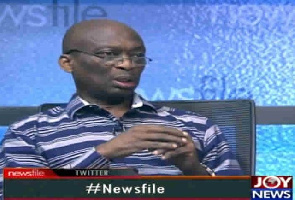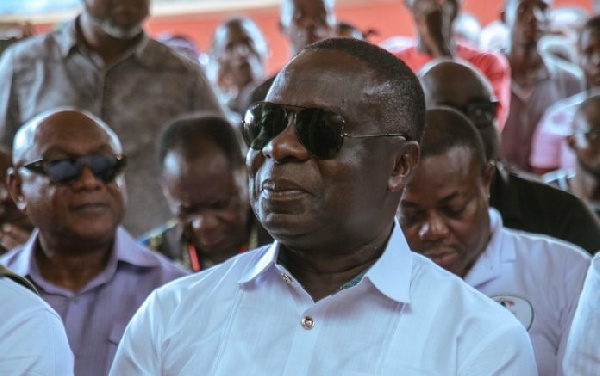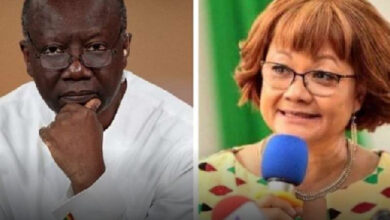Bawumia is NDC’s main headache – Baako

The brilliance of Vice-President Dr Mahammudu Bawumia presents a major challenge to the main opposition National Democratic Congress (NDC), Abdul-Malik Kwaku Baako, Editor-In-Chief of the New Crusading Guide has said.
According to him, Dr Bawumia is a good communicator, who is able to simplify economics to the understanding of everyone.
“It appears Dr Bawumia is a problem for his political opponents. I have been around Ghanaian politics for a very long time and I can tell you Dr Bawumia is one of the best communicators we have ever had. He is articulate, he is coherent and he is focused,” Mr Baako said on Metro TV’s Good Morning Ghana programme.
He added: “He makes economics very simple. He is able to reduce very complicated issues, so, I see why he represents a problem and a challenge for some people. I think the town hall meeting was a useful exercise.”
Dr Bawumia on Wednesday, 3 April 2019 said at a town hall meeting of the Economic Management Team that it is “warped” reasoning for the NDC to say that the fact that there has been a fall in the value of the cedi necessarily means Ghana’s economic fundamentals are weak.
Dr Bawumia said the cedi fall was largely due to external factors rather than weak fundamentals of the economy, unlike, in his opinion, it pertained in 2014 when he (Dr Bawumia), famously said: “If the fundamentals are weak, the exchange rate will expose you”.
According to Dr Bawumia, “Factors such as the inflation rate, the balance of trade, the fiscal balance, money supply, are what we refer to as the fundamentals. But speculation and expectations about these fundamentals; external shocks such as oil price increases, can also have powerful short-term effects on the exchange rate.
“When we see pressures on the exchange rate, first we need to determine where these pressures are coming from or whether the pressures are transitory or permanent. And as every astute central banker knows, even with strong economic fundamentals, speculation, expectation and investor sentiment can exert pressures on the exchange rate.
“Ladies and gentlemen, you will recall that I stated in 2014 that: ‘If the fundamentals are weak, the exchange rate will expose you’. That was true then and it’s true now. It is 100 per cent correct.
“But it is warped logic to jump from that to a conclusion that if there is depreciation in your currency, then the fundamentals must be weak. Do you understand the logic? If the fundamentals are weak, the exchange rate will expose you, but if the exchange rate moves, you cannot jump to that conclusion that the fundamentals are weak. That defies logic”, Dr Bawumia said, adding: “There could be external factors causing the exchange rate depreciation”.
“For example”, Dr Bawumia said, “if I tell you that if your leg is broken, you are going to be unable to walk, then I’m somewhere and somebody comes to tell me: ‘This person is unable to walk, can I just conclude that the leg must be broken?’
“There can be other reasons why you are unable to walk. But the NDC logic will insist in the face of contrary evidence that since you cannot walk, it must mean that your leg has broken.
“In 2014 … the economic fundamentals had weakened significantly, and, therefore, the depreciation was easily explained. It was not caused by dwarfs or high rise buildings as we were told. The exchange rate for 2014 had exposed the weak economic fundamentals.
“If you look on the screen, it gives you the fundamentals as we had it in 2014 and 2018. Every single one of them: real GDP growth, inflation, the fiscal balance, the wage bill, wage bill-to-GDP, gross debt, interest rate, current account, all the fundamentals, you’ll see that we were in a much weaker position in 2014 compared to 2018. So, ladies and gentlemen, how have the cedi performed recently? At the end of December 2017, the cedi had cumulatively depreciated by 4.9 per cent compared to 9.6 per cent in 2016. And this was the cedi’s best performance since 2011. And at the end of 2017, we had the best performance of the cedi till 2011.
“The cedi, however, depreciated by 8.4 per cent in 2018 largely on account of the emerging market pressure and US interest rate increase.
“The data on the annual rate of depreciation of the cedi in recent years show that the worst performance of the cedi so far under the NPP government, the 8.4 per cent depreciation that we saw since 2018, that worst performance is better than the best performance under the previous government between 2012 and 2016. So our worst is better than your best. And when you say this, this one is more like boot-for- chalewote.
“Ladies and gentlemen, the start of 2019 has been characterised by another sudden sharp depreciation of the cedi which has largely been reversed. Within a week, the cedi went up close to GHS5.9 to the dollar and then it retreated back to GHS5.07 and even was threatening to go below GHS5 but this is really an unprecedented development – that you don’t normally see such a retreat when the exchange rate depreciates. And you’ll see that in this period when there was a reversal in the cedi depreciation, the Bank of Ghana had not intervened in the market”, Dr Bawumia said.





